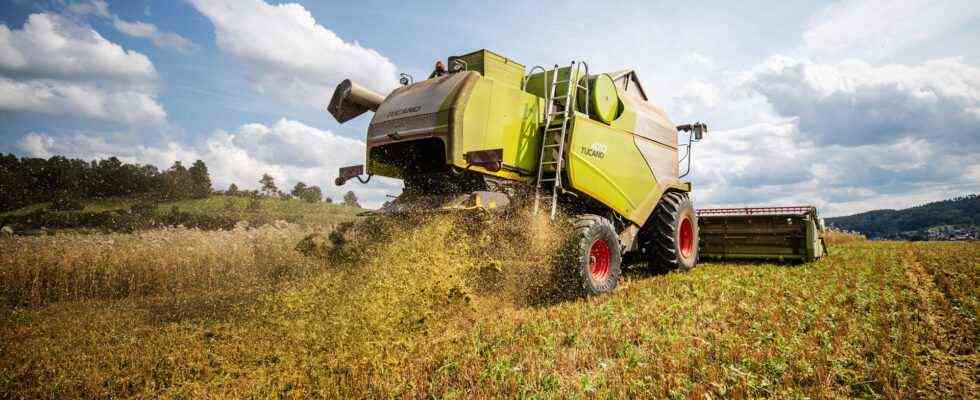As of: 08/27/2021 1:59 p.m.
The farmers’ association expects a disappointing grain harvest this year. Farmers would feel the effects of climate change directly in the form of hail and heavy rain.
The German Farmers’ Association (DBV) expects a below-average grain harvest for this year. In the case of grain, a harvest of 42.4 million tons is expected, around a million tons or two percent less than in the previous year, as the DBV announced. The harvest remains 4.7 percent below the average for 2015 to 2020, which is 44.2 million tons.
Harvest balance of the Federal Farmers’ Association: noticeable climate change
Andre Kartschall, RBB, Tagesschau 4:00 p.m., August 27, 2021
“This year’s grain harvest is once again below average,” said Farmer President Joachim Rukwied. Frequent hail and heavy rain would have shown that farmers are directly feeling the effects of climate change.
Corn benefits from summer rainfall
At first we started the harvest with confidence, “explained Rukwied. The first results were disappointing, and this was also confirmed.” The harvest in 2021 was a tremendous game. “However, the association admits that these are preliminary data. Since the harvest is not completely finished due to the weather, the numbers could change slightly. Unlike cereals, crops such as corn, sugar beet and vegetables are “in good shape at the moment.” They have benefited from the summer rainfall, it said.
The association also commented on the price development: The prices that can be achieved for the farmers have increased significantly. For example, rapeseed has increased in price by around 50 percent compared to the previous year, a ton of bread wheat currently costs 219 euros, in August of the previous year the price was 160 euros.
The scarce supply of the world markets gives reason to hope that the economic situation of the arable farms will recover at least a little from the previous lean years.
“Safe harvests cannot be taken for granted”
Last Wednesday, the Federal Ministry of Agriculture presented the official harvest report, the result of which was similar. Agriculture Minister Julia Klöckner said in Berlin that many farmers had been optimistic for a long time this time about the expectations for the harvest. “In many places, however, harvesting work has been and will be slowed down by showers and thunderstorms, which means that yields and quality are suffering.”
Klöckner emphasized that hardly any other economic sector is as exposed to extreme weather as agriculture. “Safe harvests cannot be taken for granted,” said the minister. And in the end, sooner or later, consumers would feel that too.
Arable farming strategy 2035
In order to arm fields and meadows more strongly against climate change and to protect the soil, the ministry also presented an “arable farming strategy” with prospects up to 2035 on Wednesday. One goal is more diversity in the fields. Farms should grow more crops in alternation, i.e. not just wheat, maize and barley, but also spelled, oats, soy and peas or beans.
The build-up of humus in the soil is also to be promoted. Because the larger the proportion, the longer and more soils could store carbon. New plant varieties and digitization should also help, as Klöckner said.
Criticism came from environmentalists. Instead of implementing ambitious measures together with the environmental department, the Ministry of Agriculture published a summary of mostly already known individual measures shortly before the federal election, explained the Nature Conservation Union (Nabu).

